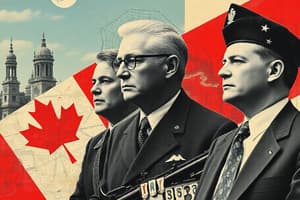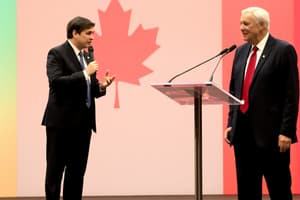Podcast
Questions and Answers
What is the main concept discussed in C.W. Mills' book 'The Power Elite'?
What is the main concept discussed in C.W. Mills' book 'The Power Elite'?
- The role of technology in shaping societal structures
- The evolution of democratic principles in society
- The struggle for power between different social classes
- The dominance of a small group of powerful people in the United States (correct)
According to Mills, what characterizes the elites in society as depicted in 'The Power Elite'?
According to Mills, what characterizes the elites in society as depicted in 'The Power Elite'?
- Strong sense of moral obligation towards the general masses
- Equal distribution of wealth among the masses
- Control over the economy, military, and politics without accountability (correct)
- High level of transparency and accountability in their actions
How does C.W. Mills describe the movement of elites across powerful institutions in 'The Power Elite'?
How does C.W. Mills describe the movement of elites across powerful institutions in 'The Power Elite'?
- Institutions maintain distinct boundaries limiting elite movement
- Elites rarely interact with each other across different institutions
- Elites have permanent membership in a single institution
- There is a seamless transition of elites between the economy, military, and politics (correct)
Which concept is central to Ralf Dahrendorf's work as mentioned in the text?
Which concept is central to Ralf Dahrendorf's work as mentioned in the text?
What relationship does C.W. Mills describe between economic, political, and military elites in 'The Power Elite'?
What relationship does C.W. Mills describe between economic, political, and military elites in 'The Power Elite'?
'The Sociological Imagination' by C.W. Mills focuses on:
'The Sociological Imagination' by C.W. Mills focuses on:
What was the main argument of the Conflict Paradigm according to the text?
What was the main argument of the Conflict Paradigm according to the text?
Who were the original contributors to the Conflict Paradigm?
Who were the original contributors to the Conflict Paradigm?
What concept did C.Wright Mills focus on in his theorizing?
What concept did C.Wright Mills focus on in his theorizing?
According to Ritzer and Stepnisky, what theories superseded the original conflict theories?
According to Ritzer and Stepnisky, what theories superseded the original conflict theories?
In the Conflict Paradigm, what is contested with the question 'What group does this function best serve'?
In the Conflict Paradigm, what is contested with the question 'What group does this function best serve'?
What was the main motivation behind developing the Conflict Paradigm?
What was the main motivation behind developing the Conflict Paradigm?
According to Ralf Dahrendorf, what is the relationship between conflict and functionalism?
According to Ralf Dahrendorf, what is the relationship between conflict and functionalism?
What are latent interests, as explained by Ralf Dahrendorf?
What are latent interests, as explained by Ralf Dahrendorf?
In the context of General System Theory, what is the significance of complexity?
In the context of General System Theory, what is the significance of complexity?
How does Niklas Luhmann define the relationship between a system and its environment?
How does Niklas Luhmann define the relationship between a system and its environment?
What role does contingency play in every system, according to General System Theory?
What role does contingency play in every system, according to General System Theory?
How does Ralf Dahrendorf believe changes in social structure are initiated?
How does Ralf Dahrendorf believe changes in social structure are initiated?
Friedrich Engels and Karl Marx were original contributors to the Conflict Paradigm.
Friedrich Engels and Karl Marx were original contributors to the Conflict Paradigm.
According to the Conflict Paradigm, class division exists in some societies but not all.
According to the Conflict Paradigm, class division exists in some societies but not all.
In the Conflict Paradigm, contestation means that functions can be disputed by questioning which group benefits the most from them.
In the Conflict Paradigm, contestation means that functions can be disputed by questioning which group benefits the most from them.
Technological change is not considered an inevitable part of society according to the Conflict Paradigm.
Technological change is not considered an inevitable part of society according to the Conflict Paradigm.
NeoMarxian theories have not evolved beyond the original conflict theories according to Ritzer and Stepnisky.
NeoMarxian theories have not evolved beyond the original conflict theories according to Ritzer and Stepnisky.
Charles Wright Mills' main contribution focused on functionalism rather than elitism in 'The Power Elite'.
Charles Wright Mills' main contribution focused on functionalism rather than elitism in 'The Power Elite'.
Ralf Dahrendorf believes that conflict can only be functional in promoting communication and cohesion among different interest groups.
Ralf Dahrendorf believes that conflict can only be functional in promoting communication and cohesion among different interest groups.
According to Ralf Dahrendorf, latent interests are conscious interests that people are aware of.
According to Ralf Dahrendorf, latent interests are conscious interests that people are aware of.
Niklas Luhmann's General System Theory states that every system adapts based on contingency.
Niklas Luhmann's General System Theory states that every system adapts based on contingency.
Conflict theorists primarily focus on the harmonious interaction between different interest groups.
Conflict theorists primarily focus on the harmonious interaction between different interest groups.
According to Ralf Dahrendorf, changes in social structure are driven by the emergence of cooperating groups.
According to Ralf Dahrendorf, changes in social structure are driven by the emergence of cooperating groups.
General System Theory suggests that humans have no responsibility to manage the complex world they live in.
General System Theory suggests that humans have no responsibility to manage the complex world they live in.
Ralf Dahrendorf's work was heavily influenced by Karl Marx.
Ralf Dahrendorf's work was heavily influenced by Karl Marx.
In society, authority does not reside in persons.
In society, authority does not reside in persons.
According to Ralf Dahrendorf, society is made up of randomly associated groups of people.
According to Ralf Dahrendorf, society is made up of randomly associated groups of people.
Conflict can only arise between superordinates and subordinates within a society.
Conflict can only arise between superordinates and subordinates within a society.
Ralf Dahrendorf's theory emphasized that groups at different levels constantly strive to protect their interests.
Ralf Dahrendorf's theory emphasized that groups at different levels constantly strive to protect their interests.
According to Dahrendorf, conflict within interest groups does not impact alliances between different groups.
According to Dahrendorf, conflict within interest groups does not impact alliances between different groups.
According to Ralf Dahrendorf, what drives changes in the social structure?
According to Ralf Dahrendorf, what drives changes in the social structure?
What concept does the Conflict Paradigm question when contesting functions?
What concept does the Conflict Paradigm question when contesting functions?
According to the Conflict Paradigm, is technological change considered inevitable in society?
According to the Conflict Paradigm, is technological change considered inevitable in society?
Do NeoMarxian theories go beyond the original conflict theories according to Ritzer and Stepnisky?
Do NeoMarxian theories go beyond the original conflict theories according to Ritzer and Stepnisky?
What do General System Theory theorists believe about humans' responsibility to manage the complex world they live in?
What do General System Theory theorists believe about humans' responsibility to manage the complex world they live in?
In the context of class division, does the Conflict Paradigm assert that it exists in all societies?
In the context of class division, does the Conflict Paradigm assert that it exists in all societies?
What is the central assumption in Ralf Dahrendorf's thesis about society?
What is the central assumption in Ralf Dahrendorf's thesis about society?
Explain the concept of 'interests' in relation to Dahrendorf's conflict theory.
Explain the concept of 'interests' in relation to Dahrendorf's conflict theory.
According to Dahrendorf, how is conflict beneficial in society?
According to Dahrendorf, how is conflict beneficial in society?
What is the main focus of neoMarxian theories according to Ritzer and Stepnisky?
What is the main focus of neoMarxian theories according to Ritzer and Stepnisky?
How does the Conflict Paradigm view the contestation of functions in society?
How does the Conflict Paradigm view the contestation of functions in society?
What does General System Theory suggest about the inevitability of change?
What does General System Theory suggest about the inevitability of change?
What are the main arguments of the Conflict Paradigm according to the text?
What are the main arguments of the Conflict Paradigm according to the text?
How did Ritzer and Stepnisky describe the evolution of conflict theories?
How did Ritzer and Stepnisky describe the evolution of conflict theories?
What concept did C.Wright Mills focus on in his theorizing?
What concept did C.Wright Mills focus on in his theorizing?
According to the Conflict Paradigm, what can be contested by asking 'What group does this function best serve'?
According to the Conflict Paradigm, what can be contested by asking 'What group does this function best serve'?
What major sociohistorical factor is considered inevitable in society according to the Conflict Paradigm?
What major sociohistorical factor is considered inevitable in society according to the Conflict Paradigm?
How did neoMarxian theories influence the development of conflict theories according to the text?
How did neoMarxian theories influence the development of conflict theories according to the text?
Flashcards are hidden until you start studying




